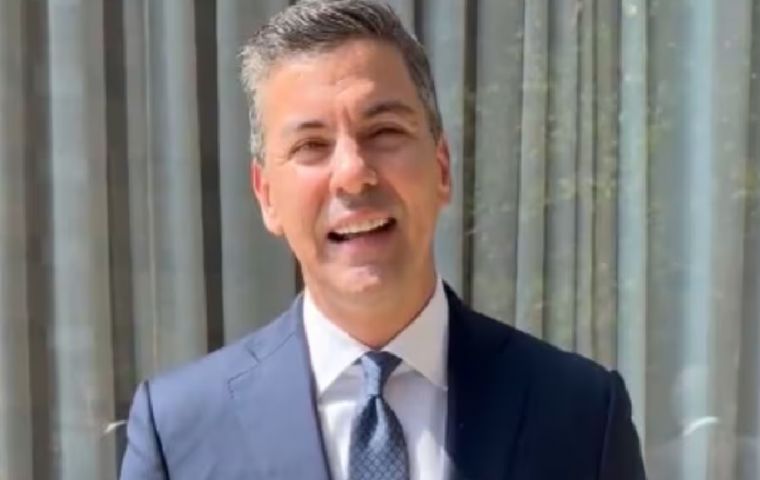MercoPress. South Atlantic News Agency
Paraguayan President says he is okay after Monday's hospitalization
 Peña shifted the spotlight from his health crisis onto sporting events
Peña shifted the spotlight from his health crisis onto sporting events Paraguayan President Santiago Peña Tuesday shared a video message on social media saying he had fully recovered from Monday's health crisis that had him hospitalized while attending the G20 Summit in Rio de Janeiro.
“Here in Rio de Janeiro recovered, I did some controls yesterday, the last days have been full of emotions, Saturday, my birthday, and how to forget Thursday, that great victory of our beloved national [football] team [over Argentina], the palpitation of the section that this afternoon will play in Bolivia for the [World Cup] qualifiers,” he said, thus shifting the spotlight from his condition onto the sports news.
Peña insisted that all the emotions felt during the past few weeks added up to his chest pains Monday but now he is fully recovered to keep representing Paraguay on the first occasion the South American country had a chance to participate at a G20 Summit.
Meanwhile, in Asunción, Health Minister María Teresa Barán said in a press conference from the Mburuvicha Róga presidential residency that Peña should look more after himself. “Perhaps traveling, not having adequate rest has caused this type of inconvenience. We are all people of flesh and blood and can have, as any of us, this decompensation.” The medical recommendations are to rest and sleep better.
Peña was discharged Tuesday morning from Rio de Janeiro's Hospital Samaritano after being admitted the day before. Also Tuesday, the Colorado leader participated in a G20 session on energy transition, where he highlighted the clean and renewable production of hydroelectric plants and defended the fight against climate change without “stifling economic growth.”
Peña also mentioned “the ominous and urgent threat of climate change” that “forces us to unite to design effective models to decarbonize our energy systems” while highlighting Paraguay's role as a world leader in the production of clean energy with a “100% clean, renewable and green” energy matrix. “My country contributes only 0.02% to global emissions and yet it stands out for its production of clean and renewable electricity,” the 46-year-old Peña underscored.
He also argued that the Itaipú and Yacyretá represented both Paraguay's integration with neighboring Brazil and Argentina respectively as well as a “commitment” to clean energy. ”Unlike more developed countries, (...) we have had the opportunity to develop in a sustainable way from the beginning,“ Peña stressed.
”My country has already demonstrated that economic growth is possible while maintaining a commitment to conservation and sustainable resource management. We have abundant natural resources, valuable human capital, and a clear focus on creating value chains that support a fully green economy,” Peña also pointed out.




Top Comments
Disclaimer & comment rulesCommenting for this story is now closed.
If you have a Facebook account, become a fan and comment on our Facebook Page!